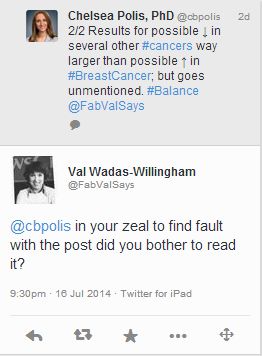To my understanding, journalists don't always get to write their own headlines, but they do have control over the balance of reporting within the story. When reporting on issues related to contraception, some stories seem to focus exclusively on risks (or present risks out of context), without reporting the benefits of a given contraceptive method.
Women deserve to know both the risks and the benefits (and any lingering scientific uncertainties!) related to any contraceptive method they may consider using.
The abstract clearly noted that among Finnish women treated with use of a levonorgestrel IUD for heavy menstrual bleeding, levonorgestrel IUD use appeared to be associated with several cancer-related outcomes. These outcomes (in the order in which they were reported in the abstract) included:
(1) A statistically significant 50% decreased risk of endometrial adenocarcinoma (which changed to a statistically significant 75% decreased risk for women who were presumed to have used a second LNG-IUD),
(2) a statistically significant 40% decreased risk of ovarian cancer,
(3) a statistically significant 50% decreased risk of pancreatic cancer,
(4) a statistically significant 32% decreased risk for lung cancer, and
(5) a statistically significant 19% increased risk of breast cancer.
This information was plainly available in the results section of the abstract, and also quite clearly summarized in the conclusion of the abstract, which reads:
Despite the numbers above, Willingham's story focused almost exclusively on the possible 19% increase in breast cancer risk -- and not at all on the possible 32%-75% decreases in risk of other cancers.
About halfway through the article, Willingham writes: "Investigators found that over time, the device did not significantly raise the risk of uterine cancer or ovarian, pancreatic and lung cancers."
Err, yes, but!...
Not only did the levonorgestrel IUD "not significantly raise" those particular risks, but it appeared to be associated with a significant decrease in those risks. Is that not information that readers should know, too? That got lost in Willingham's report (except for a small quote by Dr. Soini buried near the end of the article, which mentions only endometrial cancer).
So, who cares? Well, given the current climate around contraception - such as the recent Hobby Lobby decision which stands to have serious consequences on a woman's ability to access the contraceptive method of her choice and on a physician's ability to provide highly effective contraceptive methods such as IUDs, and recent conversations about poorly researched materials focused exclusively on the risks of oral contraceptive pills (which could be more useful if evidence-based and balanced with discussion of method benefits) - there is an awful lot of misunderstanding (or even deliberate misinformation campaigning) around scientific evidence on contraception these days. I've spent the last few years of my professional life grappling with some of the fallout and confusion that occurred from articles like this one by Pam Belluck in the New York Times.
When I tried to discuss this issue with Ms. Willingham on Twitter, this was her initial response:
We simply need to expect more from journalists covering scientific issues, especially those in respected outlets like CNN.com. As Dr. Soini and colleagues note in the concluding sentence of their manuscript: "It is important to always counsel patients about the potential benefits and risks of hormonal therapies."
I couldn't agree more.
References:
Soini T, Hurskainen R, Grénman S, Mäenpää J, Paavonen J, Pukkala E. Cancer Risk in Women Using the Levonorgestrel-Releasing Intrauterine System in Finland. Obstetrics and Gynecology 2014;doi: 10.1097/AOG.0000000000000356 (in press).
Willingham, V. "IUD may carry higher risk for breast cancer in certain women" Published on CNN Health, July 9, 2014. http://www.cnn.com/2014/07/08/health/iud-cancer-risk/



 RSS Feed
RSS Feed